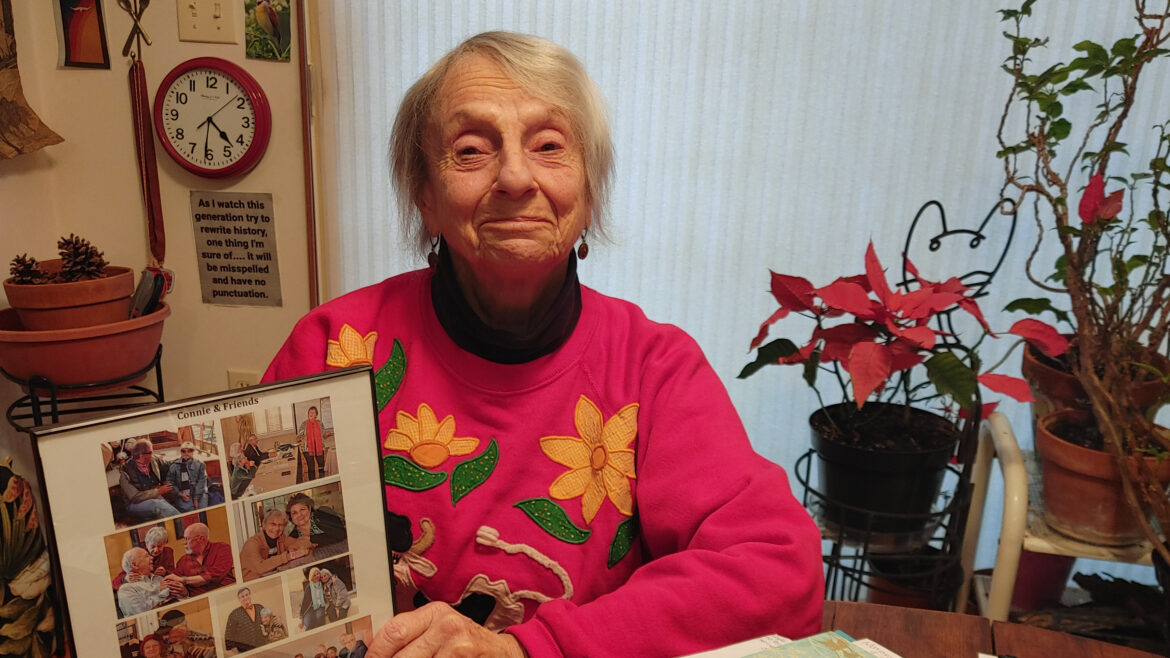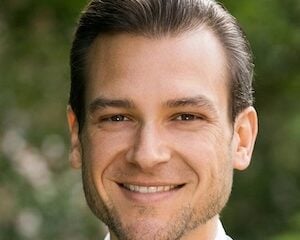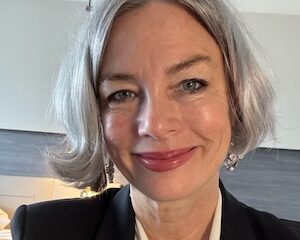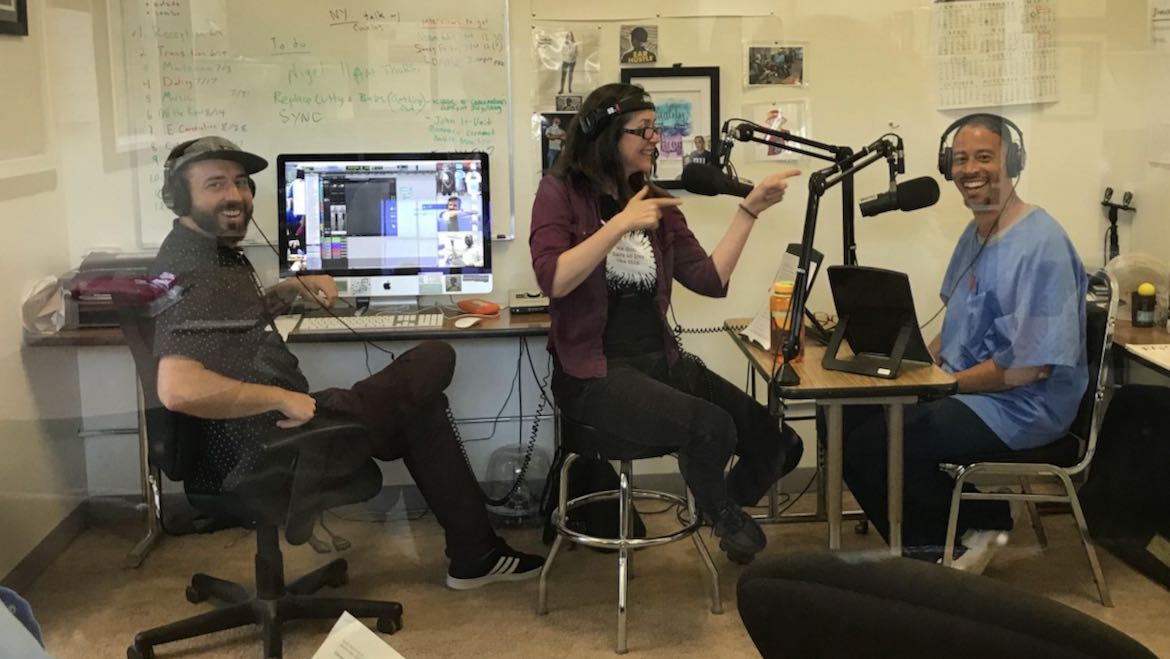Connie Goldman, former MPR reporter and ‘ATC’ host, dies at 91

Goldman on her 90th birthday.
Connie Goldman, a bohemian Minnesota Public Radio journalist and arts reporter for NPR, died March 8 of stomach cancer. She was 91.
Active and impish even in her last days, the Minneapolis native was a spirited raconteur who became a pioneering journalist in the early days of NPR. Whether ensconced in her Georgetown, Santa Monica or Wisconsin home, friends recalled Goldman welcoming them into an inviting space adorned with eclectic antiques and tchotchkes that reflected her diverse taste and love for art.

Goldman began her career as a journalist later in life, and the theme of late bloomers would persist throughout her work. Shortly after divorcing her husband, she received a master’s degree in communications from the University of Minnesota in 1971. She worked as a reporter for KSJN in St. Paul, Minn., where she first started contributing to All Things Considered in 1972.
Four years later, she traveled to Washington to fill in as co-host of All Things Considered on weekends. She would go on to host the show permanently and become an arts reporter for NPR, an organization that was in its infancy when Jim Russell, one of the founders of the program, hired her.
“She was not as fully appreciated at NPR as she should have been,” Russell said. “She was not a hard-news person, and NPR was very full of hard-news journalists … and I felt that there was a lot more to life than just that. And she was one of the people who took the arts as a very serious subject.”
Goldman did not possess what would become known as the “NPR voice,” a delivery marked by meticulous modulation. Instead she set her subjects at ease with a friendly, casual manner and a nasal Midwestern tone. Her lack of pretense became her strength as a reporter. She would show up to interviews wearing her signature patterned clothing and a crocheted vest, a look that reminded people less of a hardened journalist and more of a friendly neighbor with whom they could share their secrets, said Jay Kernis, who produced for Goldman on NPR program Voices in the Wind, which focused on pop culture. That “hippie” persona belied a savvy interviewer who knew when to be silent to keep a subject talking.
“I watched her do many interviews, and this wasn’t acting at all — when someone said something you could see it on her face, hear it in her voice, you could hear real reactions,” Kernis said. “There was nothing false about her reactions. When she was delighted, you could see it on her face, so the people in the studio could see that and respond to it.”
In a fledgling organization that identified as a community of misfits, Goldman’s pixie personality and infectious humor charmed her colleagues. Jonathan “Smokey” Baer, who worked with her as a production assistant on All Things Considered, recalled Goldman as a wide-eyed flower child whose imaginative streak often rubbed up against the serious news that NPRcovered.
“When I think of Connie, I think of somebody who was buoyant, bubbly and excited even if people were depressed and concerned or worried about whether NPR would exist,” Baer said. “She would be bouncing down the hallway, talking about the interview she had just done with some artist, and we’re working on stories on Nixon’s impeachment.”
During her time at NPR, Goldman interviewed artists, writers and performers. She was a well-read reporter with a zeal for the arts and culture, but it was her interviews with older guests that captured her imagination.
“These were exceptional people,” Goldman said in a 1994 interview with the Los Angeles Times. “They had wit and wisdom and years of experience to draw from. But the perspective of society was and still is: You’re as disposable as Kleenex, the economy doesn’t want you anymore, you’ve had your time.”
In 1983, Goldman left NPR to freelance and create her own production company. For the rest of her career, she would focus much of her work on the elderly. Goldman believed that old age could prove the most fruitful period of one’s life, a tenet she explored in multiple interviews and books, including Late Life Love: Romance and New Relationships in Later Years and The Ageless Spirit: Reflections on Living Life to the Fullest in Mid-life and the Years Beyond.
She searched for grants for her work, nabbing a $7,000 grant from the National Endowment for the Arts to produce radio shows focusing on the elderly. As she grew older, friends noted she became more concerned and often angry about the way older people were characterized by the rest of society.
“She was very concerned about ageist language, not only in relationships and families but also in public policy,” said her longtime friend Gary Solomonson.
Goldman lived an active life into her later years. She traveled across the country to speak about aging and took daily walks until about a week before her death. But even as her wit and conversation skills remained sharp, she struggled with memory loss. During her last decade she suffered from dementia, a disease she referred to among friends as her “leaky brain.”
Solomonson would often accompany Goldman on her daily walks, where she would pick up leaves around her neighborhood in Hudson, Wis., and arrange them artfully in baskets at home. They played puzzles and card games like gin rummy, which she often won, to test her memory. He was with her the day she experienced a pain in her stomach and was rushed to the hospital where doctors discovered the cancer.
“She liked being my pal. Those were our last words together, that we were pals,” Solomonson said. “I don’t have many pals in my life, but she was one. She was a mentor to me.”








This obit so beautifully captures Connie Goldman’s essence. I think she would have loved it – which is always the problem with obits — the celebration comes too late.
Some of us old timer’s remember Connie’s early radio days before MPR and NPR existed. Saturday afternoons, in the late 60’s and early 70’s, Connie was on the air from the the basement studios of 770 KUOM in Eddy Hall (U of MN), where she produced The Saturday Show.
Having known Connie for over five decades, It was my privilege and honor to be her roommate as we met regularly at aging conferences and events across the country. So many memories, poignant and fun, flood my mind. To relate just a few… We shared many thoughts and ideas on aging issues and beyond. Often she’d flash that signature Connie twinkle in her eye, “I’m pregnant with a new book; let’s talk” and so we did into the wee hours. Connie loved NYC and we met there regularly at her favorite spots in mid-town and the upper west side. One wintry afternoon near her birthday we met for lunch and Connie had an insatiable sweet tooth. I prearranged to have a tray of desserts brought to the table for her to choose a birthday favorite. With that signature twinkle, she looked at me and said “How about all of them!” With bakery box in hand, after devouring a few, what a memorable celebration. In a more serious moment, at a store, we watched a young handsome clerk wait on an attractive blonde before a few older people at the counter, to which Connie (our Mother Wisdom) looked at me and said “Just wait til you become invisible. It will happen.” Mentor, friend, sister, Connie is dearly missed yet this pintsized powerhouse will live on with us forever. We talked regularly by phone and when it was time to say Goodbye, we’d arrange our next call. Connie always said “Is that a threat or a promise.” Love you, dear Connie, and THANK YOU for your forever friendship and indelible lessons over the years.
I am honored to have counted Connie as a special friend, who mentored me as one would a younger sibling into older age. It was Connie who removed my fear of aging with her eloquent words “One does not only grow old, one grows whole.” She walked her talk, lighting the way for those many who followed her with love and faith. She will be missed.
Connie and I were fellow gardeners and I often shared pictures of what was growing in my garden seasonally. We both delighted in the changes that occurred in our gardens throughout the year. In her book, Tending the Earth, Mending the Spirit, the Healing Gifts of Gardening, Connie writes, “The seasonal changes that visit my plants teach me about acceptance, patience, faith and perseverance through the travails and triumphs that are revealed in nature. In the course of a year, I see the entire cycle of life, from birth to death and back again. I’m sure this is why our language is filled with so many season-related metaphors: the springtime of youth, the summer of prosperity, the autumn of our years, the winter of old age.” Connie lived an abundant, exuberant life, fully embracing the lessons and gifts of each season of her life. She was a friend, mentor and wise sage and she will be dearly missed.
Just learned of Connie’s death. We were neighbors in rural Hudson before she moved into town. I went on many walked with her and her dog, Bear. I helped her take Bear on his final ride to the Vet. She was a sweetheart.